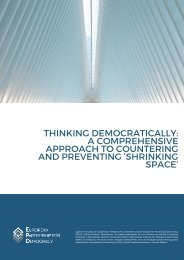Repression and resilience: Diagnosing closing space mid-pandemic
You also want an ePaper? Increase the reach of your titles
YUMPU automatically turns print PDFs into web optimized ePapers that Google loves.
REPRESSION AND RESILIENCE: DIAGNOSING CLOSING SPACE MID-PANDEMIC<br />
17<br />
varies across countries depending on the willingness of<br />
the executive to abide by the constitution <strong>and</strong> democratic<br />
principles.<br />
Accountability while working online<br />
A more broadly recurring limitation to oversight<br />
was caused by the adaptation to the online working<br />
environment, which was also a major factor inhibiting<br />
oversight by the judiciary <strong>and</strong> legislative branch. 36 At the<br />
start of the p<strong>and</strong>emic, many institutions forming part<br />
of the judiciary branch were temporarily closed. When<br />
these institutions reopened, several had to strategically<br />
pick which of the laws they would address, as it was<br />
not possible to scrutinise all newly passed legislation.<br />
In Colombia, researchers found that a lot of the<br />
government’s activities at the height of the crisis were in<br />
fact unconstitutional – even under a state of emergency<br />
– but as the courts were still adapting to the p<strong>and</strong>emic<br />
working environment, they were not functionally capable<br />
of holding the government in check.<br />
Similarly, Parliaments also had to adapt to the new<br />
remote working environment with their own specific<br />
challenges. For instance, accessing essential data<br />
<strong>and</strong> other types of information required for legislative<br />
discussion became more challenging. The struggle<br />
in making the parliamentary process digital often<br />
resulted in limited engagement with experts, advisers,<br />
civil society, <strong>and</strong> other affected stakeholders - with<br />
negative consequences for legislative inclusiveness <strong>and</strong><br />
participation. 37<br />
In addition, delegates in legislatures across countries<br />
stressed how virtual proceedings were favourable to the<br />
ruling party. In addition to the hosts’ ability to mute people<br />
<strong>and</strong> disable the chat, <strong>and</strong> the decreased transparency of<br />
record-keeping, the opposition could not apply many of<br />
the strategies that they usually used to influence power<br />
in the legislature. In Colombia for instance, the lack of<br />
negotiation outside the Congress plenary made it far<br />
more difficult for opposition actors to form coalitions,<br />
<strong>and</strong> the opposition could not derail the quorum as they<br />
otherwise would have had the capacity to do.<br />
Limited transparency <strong>and</strong> increased corruption<br />
With the state of emergency <strong>and</strong> the external funds <strong>and</strong><br />
loans for p<strong>and</strong>emic-management <strong>and</strong> recovery, many<br />
countries saw an increase in corruption <strong>and</strong> decrease in<br />
the transparency of government spending. Governments<br />
<strong>and</strong> authorities everywhere were under pressure to<br />
purchase public goods with extreme urgency, in a highly<br />
uncertain <strong>and</strong> constantly changing environment. 38 As a<br />
result, public actors were more likely to fail to abide by<br />
the rulebook in order to quickly ‘seal the deal’ <strong>and</strong> avoid<br />
delays related to the completion of paperwork <strong>and</strong> other<br />
procedures. 39<br />
Under these conditions, deep-rooted vulnerabilities in<br />
public procurement have been exposed <strong>and</strong> exacerbated,<br />
leading to increased corruption <strong>and</strong> intransparent<br />
practices. Looser requirements <strong>and</strong> under-the-table<br />
procurement processes contribute to cronyism <strong>and</strong> the<br />
infiltration of criminal actors into public service delivery.<br />
The scarcity of medical supplies further strained the<br />
procurement process by creating unequal competition.<br />
Since governments were willing to pay any price to secure<br />
essential goods, suppliers succeeded in dem<strong>and</strong>ing <strong>and</strong><br />
obtaining higher prices. 40 As a result, a non-negligeable<br />
section of global investments in healthcare did not<br />
benefit the public.<br />
36 For an overview of the impact of COVID-19 on the judiciary, see UNODC (2020): Ensuring Access to Justice in the Context of COVID-19.<br />
Available here. For an EU-level overview of the p<strong>and</strong>emic’s impact on member state judiciaries, see Civil Liberties Union for Europe (2021): EU<br />
2020 - Dem<strong>and</strong>ing on Democracy. Available here.<br />
37 Westminster Foundation for Democracy (2021): Legislative leadership in the time of COVID-19. Available here.<br />
38 OECD (2020): Public procurement <strong>and</strong> infrastructure governance: Initial policy responses to the coronavirus (COVID-19) crisis. Available<br />
here.<br />
39 The Economist Intelligence Unit (2020): The future of public spending: Responses to COVID-19. Available here.<br />
40 Transparency International (2020): Corruption <strong>and</strong> the Coronavirus. Available here.

















